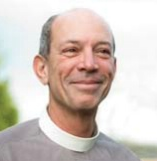The idea that God forgives, wants to forgive, continues to forgive, with no strings attached, is not a new idea. It is a pre-Christian idea. Jeremiah passed on these words as the Word of the Lord: “I will forgive their iniquity, and remember their sin no more.” I interpret these words as affirmation that God wills that we have joy and abundant life, free from the suffering that results from guilt and sin, and that no person should ever feel that he or she must suffer alone.
One of my mentors, as a young man, was Bishop John Colburn of Massachusetts who said that at the heart of the Christian life there is a great mystery: suffering and joy are inextricably bound together. But the absence of physical suffering is not the same thing as true joy. We all know people who have many more comforts, food, clothing, money, education, health, and many other things, but have not joy.
Bishop Colburn wrote, “There is no abiding joy except that it rises out of suffering. The greatest joy for a Christian is to know that, as he or she gladly embraces suffering for the love of God, a bit of God’s power is released in the world.”
It is hard for most of us to walk before others in righteousness. We may not even know what that kind of journey means. But history notes that there have been saints who have endured suffering and even death with dignity and courage. Their faith released some of God’s power in the world.
Two years ago, I went on a trip with my students to South Africa. We learned a great deal about the apartheid regime. I discovered that an Anglican monk named Michael Lapsley had been part of the movement against apartheid. Months after Nelson Mandela was released from prison, Fr. Lapsley received a letter in the mail. Placed between the pages of a religious journal was a letter bomb. The explosion left him with no hands, one eye, shattered eardrums and other injuries. He spent a long, long time in hospital. His story was printed in a recent Lenten Study pamphlet put out by Episcopal Relief and Development. I found the following most compelling. It says that when people inquired about how Fr. Lapsley survived, he answered: “Somehow, in the midst of the bombing, I felt that God was present. I received so many messages of love and support from around the world that I was able to make my bombing redemptive—to bring life out of death, good out of evil.”
Out of pain came Fr. Lapsley’s greatest calling as a priest. He founded the global ministry Institute for Healing of Memories. “I am more of a priest with no hands,” he said, “than I was with two.”
My question today is: how can we bring more joy into our own lives? Maybe one way is to believe that there is an interrelatedness of the Spirit in and through all relationships—in families, communities, political groups, and nations. When all is said and done, the greatest gift we can give each other is to accept our own suffering joyfully for the love of God and thus release as much of God’s power into the world as we can, that our friends and families, enemies and world powers, may be strengthened by God’s Spirit to carry the crosses of suffering with authentic dignity and true courage.
